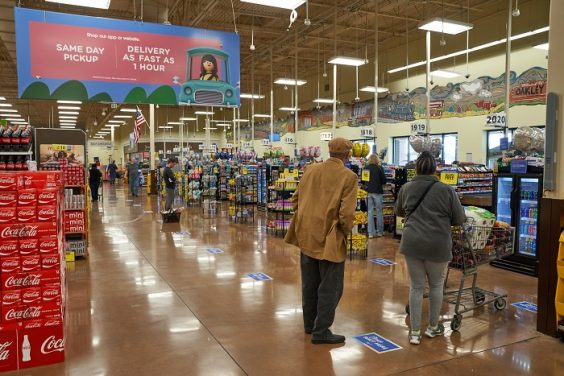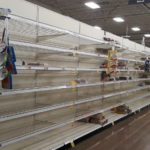
What a difference a global pandemic makes, when it comes to how satisfied shoppers are with their favorite grocery stores.
Each year, the Retail Feedback Group releases a survey gauging how people feel about their grocery shopping experiences – what they like, what they think could be better, and what methods they use to save money. It’s a good way to measure how grocery stores are doing year over year, and how our shopping habits are changing.
And then the coronavirus came along – and changed everything.
The RFG has released an expanded set of survey results as part of its “2020 U.S. Online & In-Store Grocery Shopping Study.” And it finds that a whole lot has changed, and not all for the better.
Each year, survey respondents are asked to rate specific store attributes on a five-point scale. Scores on attributes like store cleanliness, food quality and value for the money tend to fluctuate from year to year. But this year, every single one of them was down from last year’s survey. Among shoppers who were surveyed in late April and early May for this year’s report, cleanliness scores dipped just a bit, quality slipped further, and variety/selection and value for the money both plummeted to new lows.
That is perhaps not a surprise, since grocery prices have soared over the past few months, good deals are harder to find, and stores have struggled to keep many items in stock. And, as the RFG survey points out, don’t think shoppers haven’t noticed.
Finding products they wanted “presented a major challenge for shoppers,” the report found. About half of both in-store and online grocery shoppers said their store didn’t have everything they wanted the last time they shopped. “Considering positive in-stock conditions lead to higher satisfaction, these out of stock conditions resulted in not only lost sales, but lower overall satisfaction,” the RFG warned.
Also leading to lower satisfaction, is overspending. In order to avoid luring too many shoppers into stores, by promoting items they may not have had in stock anyway, many retailers cut back on the deals they offered and even quit publishing weekly sales circulars for a time. Last year, three-quarters of all shoppers said they took advantage of at least one money-saving method, such as clipping coupons or consulting the weekly ad. This year, only about half did. The biggest declines were in reviewing the circular in store, and taking advantage of in-store promotions. “This isn’t surprising given the reduced focus on sales versus having product in stock during the pandemic, and the then-current guidelines that indicated touching items could spread COVID-19,” the report reads.
Coupon use also declined sharply. Last year, for the first time in the RFG survey’s eleven editions, shoppers’ preference for digital coupons surpassed their interest in traditional paper coupons. This year, that gap widened. Digital coupon use held relatively steady, with about 34% saying they used them this year. But paper coupon use declined among RFG survey respondents from 29% last year to only 24% this year, reflecting the facts that good paper coupons were harder to find earlier this year, many shoppers were more concerned with stocking up than searching for deals, and one major retailer stopped accepting paper coupons altogether. That said, older shoppers apparently still like saving money – compared to Millennials and Gen X shoppers, Boomers were the only age group whose use of both paper and digital coupons actually increased from last year.
Overall, it seems many shoppers are more interested in getting what they need at the store and getting out, than they are in saving money and looking for deals. A majority of shoppers told RFG that they’re shopping less frequently during the pandemic, but spending more per trip by buying enough to last them longer. That’s particularly true for nonfood items like personal care, paper and household products. “Pre-pandemic, 39% kept a few months or more than a few months of these products on hand, and now 57% do so,” the report noted.
And don’t expect those behaviors to change much, especially as coronavirus cases rise in some areas, and there are renewed fears of more shortages, empty shelves and purchase limits. Over the next year, the majority of shoppers say they anticipate shopping about the same as they do now – making fewer trips, but spending more each time.
That’s partly because many shoppers feel safer when they’re not shopping at all. Only a third of survey respondents said they’re confident that it’s safe to shop in a store. When asked what their stores are doing well, shoppers were largely pleased with the stores’ efforts to keep things clean and sanitized. When asked what stores are not doing well, one of the top responses was not requiring shoppers and/or employees to wear masks. And, interestingly enough, “implementing social distancing measures” was among the top responses in both categories – some feel their stores are doing very well at distancing, while others believe their stores are not doing well at all.
Much has been said about how the coronavirus pandemic is leading to massive growth in online grocery shopping. And the RFG survey found this to be the case as well. Not only are more people ordering groceries online instead of shopping in stores, but many shoppers are doing both – half of in-store grocery shoppers said they have also ordered groceries online in the last 30 days. But there appears to be a limit to online groceries’ growth – according to RFG’s findings, “in-store shoppers who have not already tried online shopping during the pandemic mostly don’t plan to do so.”
Someday, we’ll likely look back at 2020’s survey results as an anomaly – it was the year that grocery shopping and saving money became a challenge like never before. But, who knows, some changes that occurred this year may prove to be permanent. One can only hope that spending more and saving less aren’t among them.
Image source: Kroger















